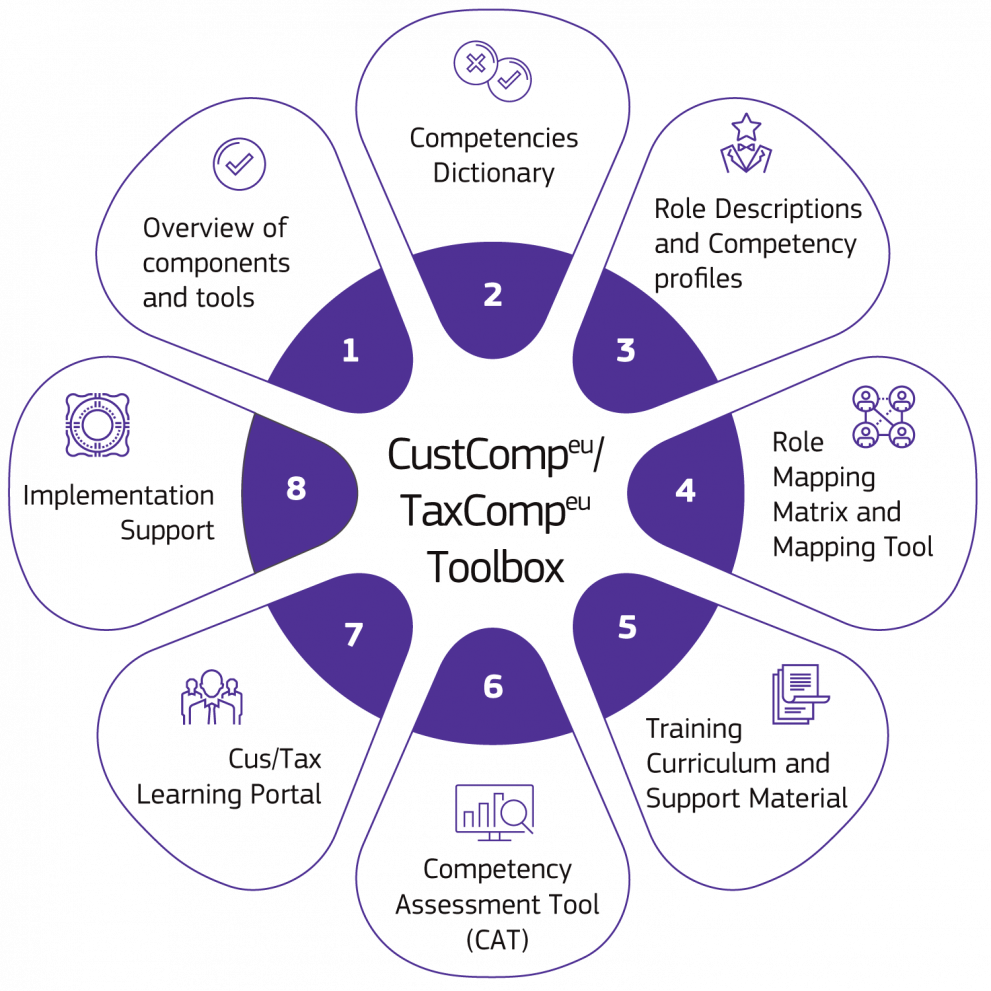The European Union Customs Competency Framework (CustCompeu) aims at harmonising and raising customs performance standards throughout the EU.
It has been developed in collaboration with public and private experts from EU countries, the World Customs Organization (WCO) and other international sources.
There are two versions of the CustCompeu
- A version for Customs Administrations (available in 22 EU languages)
- A version for businesses dealing with Customs (available in English)
Download the EU Customs Competency Framework
What is the EU Customs Competency Framework?
The CustCompeu is the foundation which sets out a consensus view of the optimal set of knowledge, skills and behaviours required by customs professionals in the EU.
It also further defines public and private Customs roles and offers tools to map and adapt the agreed EU Customs competencies and role descriptions to different customs organisations and structures, both for national administrations and businesses.
It allows to:
- identify competency gaps and training needs
- assess staff against established standards
- improve both operational and human resources processes
- allow for data driven decisions
- expand on sharing best practices and the creation of a thriving EU Customs community
- create significant cost efficiencies
What are the framework’s components?
The framework consists of a variety of capacity-building tools designed specifically for the Customs profession. It lists and describes four groups of competency areas:
- the core values
- professional competencies
- operational competencies
- management competencies
The meaning and scope of the four categories and each competency are set out in the EU Customs Competency Dictionary for the Public and Private sectors.
All competencies are further specified with well-defined proficiency levels:
- Aware
- Trained
- Advanced
- Expert
Common EU Customs Role Descriptions (each followed by a unique to the role Competency Profile) describe in detail the responsibilities, behaviours and optimal blend of competencies Customs professionals are expected to learn to be considered successful in their roles.
- EU Customs Role Descriptions, Policy
- EU Customs Role Descriptions, Client Management
- EU Customs Role Descriptions, Risk Management updated 2023
- EU Customs Role Descriptions, Declaration Processing
- EU Customs Role Descriptions, Control
- EU Customs Role Descriptions, Investigation
- EU Customs Role Descriptions, Enforcement
- EU Customs Role Descriptions, Audit
- EU Customs Role Descriptions, Supportive Functions
- EU Customs Role Descriptions, Cross Functional
Complementing the CustCompeu toolbox is the European Training Curricula for Customs. It provides a comprehensive analysis of the suggested learning topics and outcomes (linked to the designated competency areas) to be achieved by Customs specific training initiatives. As such, it supports improved and more consistent Customs operations and organisational performance across Europe.

Training for Customs professionals
Building on this framework, two EU Customs Training Curricula, one for the Public sector (Professional, Operational, Managementcompetencies) and one for the Private sector (Professional, Operational, Management competencies) have been developed.
These curricula set out the ‘Learning Topics’ and ‘Learning Outcomes’ for training programmes that are tailored towards customs professionals working in the European Union. As such, they support improved and more consistent Customs operations and organisational performance across Europe.
Recent developments and challenges in Customs have required the update of the Risk Domain in CustCompeu, which has been renamed as the Risk Management Domain and has been enhanced with strong profiles of Operational, Professional and Management Competencies, with higher proficiency levels for all roles.
As such, certain Professional and Operational Risk Management related Competencies in the EU Customs Training Curriculum have also been updated and enhanced to incorporate the need for Customs professionals to anticipate, mitigate and address risks.
Reference Training programmes
In addition, a set of Reference Training Programmes for Academic Customs Education (and 2019 Reference Training Programmes for Academic Customs Education revision document) has been created for training providers as a basis for comparison. This will help to build or enhance their academic programme structures and training materials.
The recently updated (2023) CustCompeu Reference Training Programme for Risk management provides an example of organising training content tailored to specific roles or departments of Risk Management within National Customs Administrations. It sets excellence standards in customs-specific EU training, commonly agreed and approved, whilst remaining highly flexible and customisable. Moreover, it can be shared with staff in national administrations, allowing them to take ownership and accountability of their professional development.
Download the CustCompeu _Reference_Training_Programme_Risk_management updated 2023
Recognition process and quality label for Customs Academic Study Programmes
Running since 2018, the EU Recognition Process for Customs academic programmes makes it possible to deliver a quality label for accredited Academic Customs programmes (Master’s, Bachelor’s, and modules within those programmes).
The EU Recognition Process for Customs provides quality assurance to both the academic institutions and the students of the equivalent programmes. In this way, it further harmonises and raises Customs performance standards throughout the European Customs Union.
Learn more on the EU Recognition Process for Customs academic study programmes..
